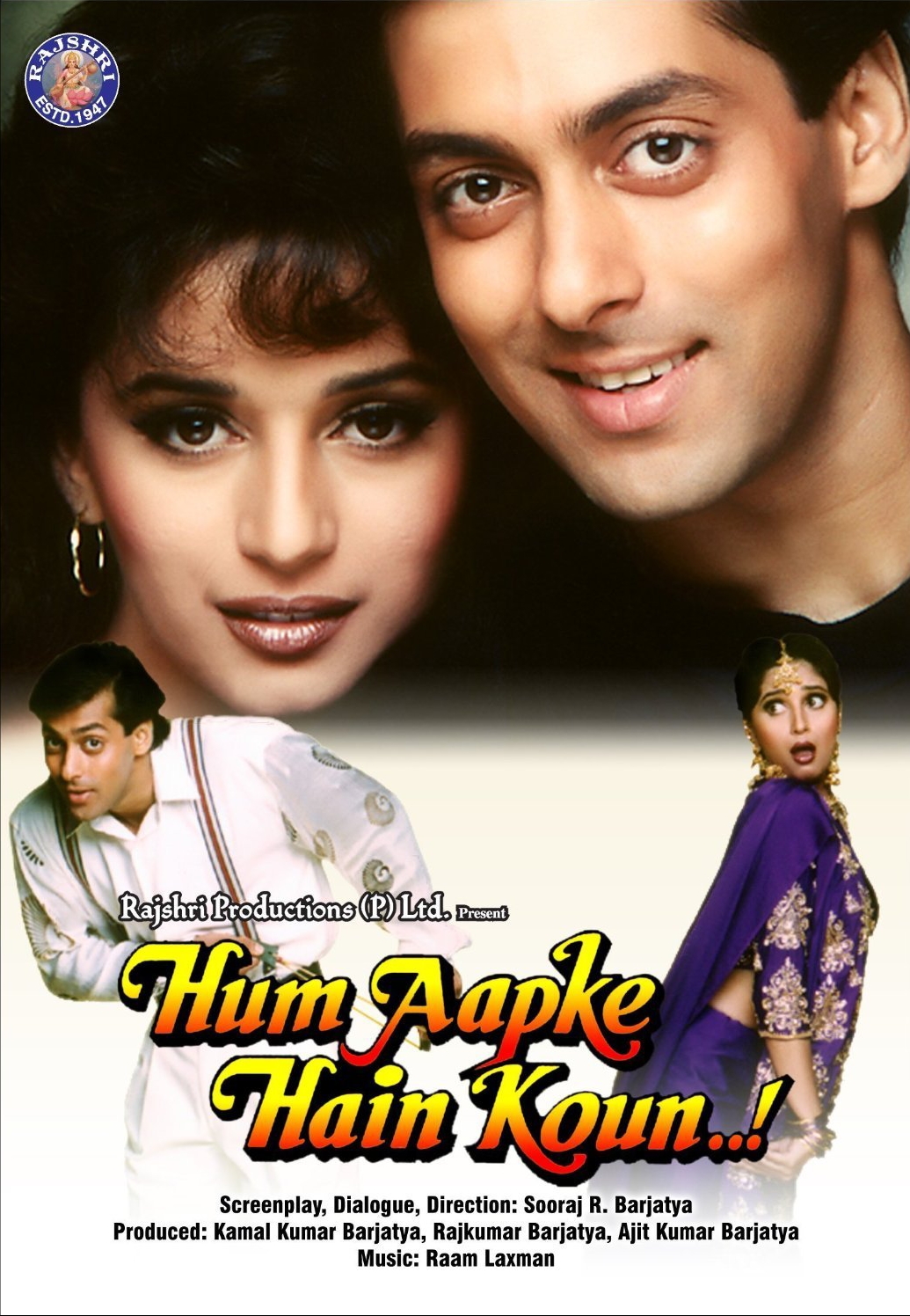If ever a film captured the essence of Indian family life and values with elegance and charm, it’s the classic Hum Aapke Hain Koun..! Released in 1994, this romance-drama, directed by Sooraj Barjatya, stars Salman Khan and Madhuri Dixit in lead roles. The film is set in contemporary India, revolving around two affluent families, showcasing a vibrant mix of traditional family rituals, relationships, and the blossoming of love between the younger generation. Known for its portrayal of Indian customs and ceremonies, it’s the epitome of a feel-good, family-centric romantic drama.
The story follows Prem, played by Salman, and Nisha, portrayed by Madhuri, who meet at the wedding of their elder siblings. What starts as playful banter between the two gradually turns into affection as they get closer during family functions and celebrations. The film, however, takes a dramatic turn when an unexpected tragedy befalls the family, forcing Prem and Nisha to make difficult choices for the sake of familial responsibility. While the narrative is largely focused on the rituals and festivities surrounding family life, it delves into love, sacrifice, and the importance of relationships, with each character playing an integral role in weaving the larger story together.
One of the standout aspects of this film is the brilliant chemistry between Salman and Madhuri. Salman plays the charming, mischievous Prem, whose carefree attitude adds a playful element to the narrative, while Madhuri’s portrayal of Nisha is elegant, sweet, and emotionally nuanced. Their relationship develops subtly, through shared glances, teasing moments, and beautifully choreographed songs. It’s refreshing to see how their bond evolves, not through grand declarations of love, but through tender moments shared amidst family gatherings. Madhuri’s expressive performance as she navigates moments of joy, confusion, and emotional turmoil showcases her immense talent. Salman, on the other hand, brings warmth and sincerity to his character, making Prem likable and relatable.
The direction by Sooraj is a masterclass in balancing grandeur with intimacy. The movie is known for its extravagance in showing Indian ceremonies—from weddings to baby showers—and he captures the minutiae of these occasions with a sense of authenticity and reverence. The elaborate set designs, vibrant costumes, and carefully curated rituals lend a celebratory tone to the film. However, what sets the direction apart is how Sooraj allows emotional depth to permeate through these joyful moments. He uses these grand settings not only to entertain but to enhance the emotional arcs of the characters.
The music, composed by Raamlaxman, is integral to the film’s charm. The songs are not just filler; they drive the narrative forward, expressing the inner feelings of the characters. Tracks like “Didi Tera Devar Deewana” and “Pehla Pehla Pyaar” became instant classics, combining catchy tunes with beautifully choreographed dance sequences. Madhuri’s dancing in “Didi Tera Devar Deewana” remains iconic, and the chemistry between the lead actors during the songs adds layers to their relationship. The music captures the celebratory mood of the film while also tugging at the audience’s heartstrings during emotional sequences. Even after all these years, the songs retain their popularity, proving the timeless appeal of the soundtrack.
Cinematography plays a crucial role in bringing the film’s vibrant world to life. The grand sets, vibrant costumes, and colorful decor are shot with an eye for detail, making each frame visually pleasing. Whether it’s capturing the grandeur of the wedding sequences or the more intimate family moments, the camera work effectively adds richness to the story. There’s a distinct warmth to the lighting and the choice of bright, festive colors that complement the mood of the film. The film’s visuals immerse the audience in the world of the characters, making the celebrations feel larger than life, while still grounding them in relatable emotions.
One cannot talk about Hum Aapke Hain Koun without acknowledging the supporting cast, who provide depth to the family dynamics. Each character, from Anupam Kher’s playful yet wise father to Renuka Shahane’s portrayal of the elder sister Pooja, adds layers to the family unit. Their performances are convincing, adding authenticity to the depiction of family life. The film’s focus on family values is further emphasized by the seamless interactions among the characters. There’s a genuine warmth and camaraderie that transcends the screen, making the audience feel like they are part of the family.
Another notable aspect of the film is its pacing. Given the film’s length—over three hours—it might seem like a test of patience for today’s audiences. However, the movie maintains a delicate balance between lighthearted moments and the more emotional beats. While the first half is filled with joy, celebration, and flirtation, the latter half shifts in tone to focus on sacrifice and the complexities of family obligations. This tonal shift is handled with sensitivity, ensuring that the narrative remains engaging throughout.
In conclusion, Hum Aapke Hain Koun.. is more than just a film; it’s a cultural milestone that celebrates Indian family values, love, and relationships. It’s a testament to the strength of familial bonds, the joy of shared celebrations, and the power of love that blooms quietly amidst these connections. The performances by Salman and Madhuri anchor the film, with their on-screen chemistry lighting up every scene they share. Sooraj’s direction, combined with Raamlaxman’s memorable soundtrack, vibrant cinematography, and the heartfelt performances of the supporting cast, make this movie an unforgettable cinematic experience.
For anyone who enjoys feel-good family dramas with a touch of romance, this film is a must-watch. It might feel a bit lengthy to today’s audience, but the film’s emotional depth and charm make it worth the time. It’s a movie that has retained its popularity for decades, and its timeless themes ensure that it will continue to resonate with audiences for years to come. Whether you’re watching it for the first time or revisiting it for nostalgia, this film offers a heartfelt, wholesome experience that leaves you with a smile.







